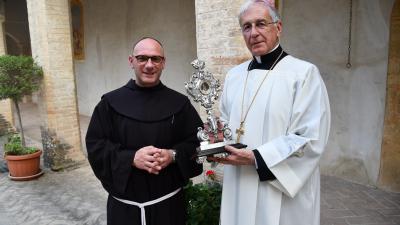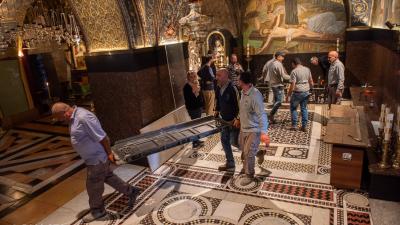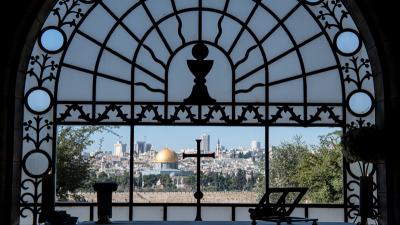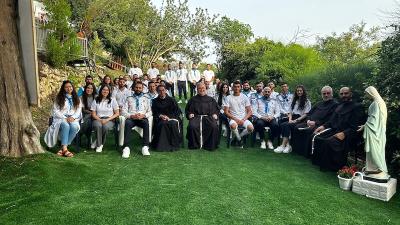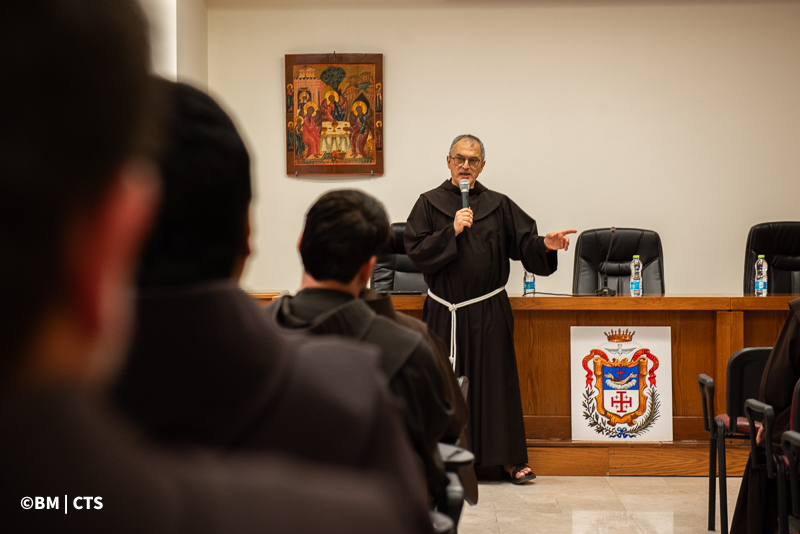
It was a visit that had been scheduled for a year and it fell exactly on the days of greatest tension in Israel, with the war underway in Gaza and the risk of the opening of various fronts. The Minister General of the Order of Friars Minor, fra Massimo Fusarelli, in an interview for the website of the Custody, reflects on the situation and the challenges of the community of the Custody of the Holy Land, but also on the meaning of living the charism of St Francis in a land marked by the “stigmata”, the wounds of Christ, as well as on the importance of dialogue, presence and the language of love.
When this visit was planned, this latest war had not yet broken out. You arrived the day after the Iranian attack. Can we say that the fact that you are here exactly on these days, close to your friars, is also a sign of Providence?
This visit should have been by a much larger group, with the presence of all the friars of the General Definitorium. In the end, the circumstances meant that only I came with the Vicar General. Many people advised us not to come due to the great danger, but having considered that the friars, the Christians, live here in danger every day, I thought that I could come for a few days as well. It was exactly in this spirit of closeness and listening that I came. I also believe that in my service as Minister General, it is important to come to the Holy Land not only once every six years, but more regularly, to accompany this presence. I cannot solve anything, but I can be here, and this is very important.
At the moment, when it does not appear possible to find points where the two sides can meet or understand each other, how do you consider the importance of dialogue which has always been a central point of the Franciscans’ mission in this Land?
In dialogue, each of the two parties must be ready to lose something, each one must be ready to take a step back, and this seems very difficult to me at the present time. In the dialogue that St Francis had with the Sultan, Francis was willing to find in this man a positive word and the Sultan was also open to Francis: this allowed their encounter. The war took place, the Christians were defeated on the battlefield and Francis solved nothing in the immediate. However, the force of that meeting and of that step back that both took was so decisive that we are still talking about it today. I think that if Francis were in the middle of the battlefield now, he would try to help everyone take a step back and look at the good of these peoples and this land.
This year, we are celebrating the centenary of two shrines here in the Holy Land: the Basilica of the Transfiguration on Mount Tabor and the Basilica of the Agony at Gethsemane. What does it mean for the Franciscans to still be the guardians of the Holy Places amid so many difficulties?
St Francis often uses the verb “look after”. Looking after does not mean putting something under glass or hiding it. Looking after is keeping, listening to, watching and entering even further the profound mystery we are living. Looking after the Holy Places for us means being in these places dynamically, first of all, with continuous prayer and with continuous intercession. Looking after also means allowing these places to speak today, even with the language of art. I once again admired the church on Mount Tabor, that of Gethsemane and the Flagellation. It was the same architect who succeeded, through the language of art, in expressing something of the language of art, expressing something of the mystery of Christ which we remember there. The languages of art, of prayer and the fundamental language of remaining in these places tells us that God loves this land and loves the world. I am very grateful to the language of art and remembering the hundredth anniversary of these basilicas. Seeing this contrast between light and darkness - this is the title of the exhibition that there is in the churches by Barluzzi (the architect who designed them, Ed.’s note) returns to us the flavour of our mission here, it reminds us of it and I hope that this centenary helps us to relive this Grace.
Another important anniversary is 800 years since the stigmata. What does it mean to live the Franciscan charism in the places that bear these signs of the Passion? Is there a Franciscan way to peace?
I use the Italian expression “stigmata,” with the G, which recalls the wound. Francis received the wounds of the Lord and like Jesus, remained wounded. Jesus always carried in himself the marks of the Passion, the Resurrection did not cancel the wounds. Francis reminds us that the stigmata, the wounds of our human condition remain. The Christian learns to live in a reality full of stigmata, of wounds and through the new eyes of the faith. The first new gaze of the faith which I can see in my brothers and sisters around the world is first of all a gaze of love: staying there, close to these people and loving them. People understand this language straight away. The second gaze is denouncing, to become a word of peace above all for those who cannot speak and without a voice because nobody listens to them, i.e. the poor. Then we begin - the third point - to do works of peace, concrete signs of peace inside and through the wounds.
The Custody is defined the “pearl of the missions” of the Franciscan Order and in your next Letter to the Order, you will invite the friars to be willing for this mission…
The expression “the pearl of missions” is typically ours and is slightly rhetorical because we say it and then it remains there. It is a pearl which has to be looked for, that has to be loved and that you have to go and look for, not a pearl to be put in a museum. I want to remind the friars that this is the first mission of the Order, together with Morocco, and it is an example of the missions of the Order. Living in the midst of people of another faith, of another culture and of another language as brothers and friars minor. The Holy Land has been entrusted to us by the Church. It is the “pearl of missions” because we answer a call of the Church. I want to help the friars once again become more aware of this call. It is not “I feel up to going there,” but “I am answering a call,” like the whole mission.
How did you find the friars of the Custody and which words do you want to leave to them?
I found the friars better than I thought: hurt by everything that is happening but also determined to remain here. The first words are, “Please, brothers. Stay here.” Many are going away, from both the peoples of this land. Even the Christians are leaving. We are remaining. Of course, we do not have our families or our children here, perhaps it is easier for us. But staying here is a very great sign. Staying not shut up in our convents, but staying with the people. And then remaining as intercessors - the second word. Remaining like those who walk in between the two sides, reminding God that this is his people, offering ourselves for peace to God, as the friends of God di in the Scripture: Abraham says “If you do not have pity for them, Lord, take me away with them as well.” The third word is “look at the future from now.” While we are blocked by the war, look at the future from now.
Marinella Bandini


